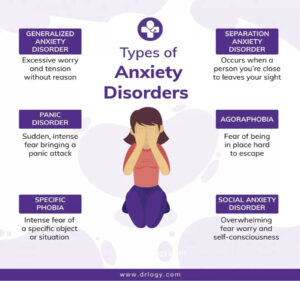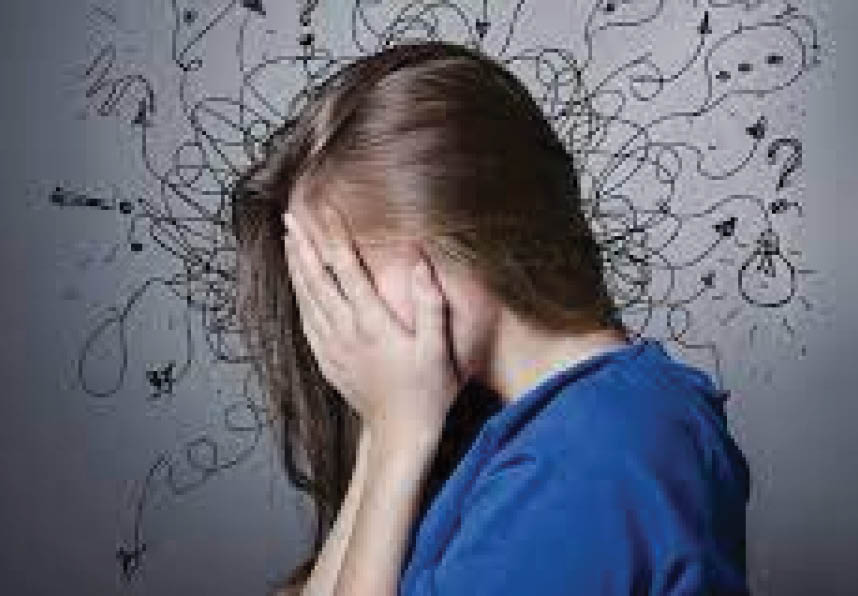Everyone undergoes anxiety at some point in their lives – be it for a job interview, first day at school or college, or the prospect of parenthood. Anxiety is a common experience we face with situations that are difficult or threatening. It’s linked with emotions like fear and worry.
 Anxiety itself can be a helpful emotion, as it helps you prepare for future events, thereby improving your performance. It sprouts symptoms like an increase in your breathing rate and heart rate, concentrating the blood flow to your brain, where you need it. This physical response prepares you to face intense situations. However, sometimes, anxiety can become so severe that it starts disrupting your daily routine and life, as a whole. At this point, the anxiety experienced has gotten out of proportion and you end up feeling much more anxious than anyone else would if faced with the same situation. There are numerous anxiety disorders, depending on the nature of the symptoms. But let us first understand the differentiating factors:
Anxiety itself can be a helpful emotion, as it helps you prepare for future events, thereby improving your performance. It sprouts symptoms like an increase in your breathing rate and heart rate, concentrating the blood flow to your brain, where you need it. This physical response prepares you to face intense situations. However, sometimes, anxiety can become so severe that it starts disrupting your daily routine and life, as a whole. At this point, the anxiety experienced has gotten out of proportion and you end up feeling much more anxious than anyone else would if faced with the same situation. There are numerous anxiety disorders, depending on the nature of the symptoms. But let us first understand the differentiating factors:
FEAR V/s ANXIETY: How do we distinguish anxiety from fear, given that the two are often used interchangeably? Fear, like anxiety, is a familiar emotion – it’s part of everyone’s experience and we consider it an essential component of humanity. Yet it’s also a psychological, physiological and behavioural state we share with animals when confronted by a threat to our wellbeing or survival. Fear increases the body’s arousal, expectancy, and neurobiological activity, and triggers specific behaviour patterns designed to help us cope with an adverse or unexpected situation.
The fundamental difference is that while fear often has a specific, immediate context which provokes the classic ‘fight or flight’ reflexes – which can also subside quickly once the perceived or actual threat has passed – anxiety connotes lingering apprehension. Anxiety involves a feeling of chronic sense of worry, tension or dread, the sources of which may be unclear. It can be a vague, unpleasant emotion experienced in anticipation of some ill-defined stressor or trigger.
STRESS V/s ANXIETY: Just as lifting a heavy weight stresses your body muscles, external factors can stress your psyche. Stress and anxiety are part of the same bodily reaction and share similar symptoms, making it hard to tell them apart. The fundamental difference is that Stress tends to be short term and in response to a recognized threat. Anxiety lingers on. The main difference between stress and anxiety is the presence of a specific trigger. Like fear, stress is typically tied to a specific situation. Once that situation resolves, so does your stress. Anxiety, by contrast, doesn’t always have a specific stressor.
PANIC ATTACK V/s HEART ATTACK: Since both these also share similar symptoms, it’s difficult to tell the difference. Both, panic and heart attacks, cause chest discomfort, but the difference is that in a heart attack, pain radiates to other areas like the arm, jaw or neck, whereas in a panic attack, the pain typically stays in the chest.
During a Heart attack, one experiences Chest pressure; Feeling of squeezing or, like something really heavy on your chest; and/or an achy or burning sensation, like heartburn. During a Panic attack, one experiences sharp or stabbing pain (not typical with a heart attack); and the heart racing or chest discomfort that’s hard to describe.
One key distinction is that a heart attack often develops during physical exertion, whereas a panic attack can occur at rest. A heart attack is more likely to develop when the work load of the heart increases, for example while a person is running up the stairs or doing intensive exercises, especially in people who do not routinely engage in physical exertion. Another difference is duration: Panic attacks tend to gradually subside and resolve on their own within about 20 minutes. A heart attack, however, will often continue and may worsen over time. However, it is always best to seek immediate medical attention when in doubt.
SYMPTOMS OF ANXIETY: Symptoms of anxiety disorders vary depending upon specific disorder, frequency of symptoms, presence of co-occurring mental health disorders, and severity of the disorder. Common signs and symptoms of anxiety disorders include:
Behavioural Symptoms: Restlessness and agitation; Inability to sit still and remain calm; Social withdrawal and isolation; Agoraphobia; Inability to properly meet responsibilities at home, work, or school; Irritability; Exaggerated startle reflex; Decreased ability to perform normal activities of daily life; and Usage of drugs or alcohol to self-medicate the symptoms
Physical Symptoms: Shortness of breath; Fatigue and exhaustion; Insomnia; Notable changes in patterns of eating or sleeping; Excessive perspiration; GI symptoms: nausea, vomiting, diarrhoea; Muscle tension and pain; Frequent headaches; Nightmares and night terrors; Pounding of the heart; Fine muscle tremors; Syncope; Cold or sweaty hands and/or feet; Numbness or tingling in hands and/or feet; Dry mouth
Cognitive Symptoms: Difficulties concentrating; Anticipating the worst outcomes; Mind often going blank; Irrational fears and dread; Uncontrollable, obsessive thoughts; Feeling as though one is going crazy.
Psychosocial Symptoms: Feeling helpless; Feelings of panic, fear, and uneasiness; Mood swings; Feeling worthless; Hopelessness and despair; Feeling in danger; Flashbacks; Feelings of dissociation
TREATMENTS FOR ANXIETY DISORDER:
- Medication: Several drugs are used to treat anxiety disorders. Discuss the pros and cons with your doctor or psychiatrist to decide the best medication for you.
- Psychotherapy: is a type of counselling that helps you learn how your emotions affect your behaviour. A trained mental health specialist listens and talks to you about your thoughts and feelings and suggests ways to understand and manage them and your anxiety disorder.
Here are a few tips for those dealing with Anxiety to help you better control and manage your symptoms:
Learn About Your Disorder: Information is your best friend. The more you know, the better prepared you are to manage roadblocks along the way. Don’t be afraid to ask your doctor any questions.
Stick To Your Treatment Plan: The treatment of any anxiety related disorder happens over time. Therefore, one has to give themselves the required time. Suddenly stopping your meds can cause unpleasant side effects and can even trigger anxiety symptoms.
Watch What You Consume: Cut down on caffeine products like coffee, tea, cola, energy drinks and chocolate. Caffeine is a mood-altering drug, and could worsen the symptoms of anxiety disorders. Avoid alcohol and recreational street drugs. Substance abuse increases your risk of anxiety disorders.
Get Movement Across The Day: Brisk aerobic exercises like jogging and biking help release brain chemicals that improve your mood.
Be Mindful Of Your Sleep: Sleep problems and anxiety disorders often go hand in hand. Following good sleep hygiene practices goes a long way.
Learn To Relax: Stress management is an important part of your anxiety disorder treatment plan. Meditation or mindfulness helps you unwind after a stressful day and boosts your treatment.
Keep A Diary: Writing down your thoughts before the day is down helps you relax so you’re not tossing and turning with anxious thoughts all night. It also serves as a good tool to manage negative thoughts.
Stay Connected: Whether it’s in person, on the phone, or the computer, social connections help people thrive and stay healthy.
Seek Support: Whether it is with family, friends or a mental health professional – seeking support is a good way of keeping your anxiousness at bay.
Disclaimer: This article is for educational/informational purposes only. it’s not intended to serve as a substitute for actual mental health care. Please consult a qualified mental health practitioner if you find yourself dealing with any of the above mentioned concerns and to formulate an accurate diagnosis and treatment plan.
